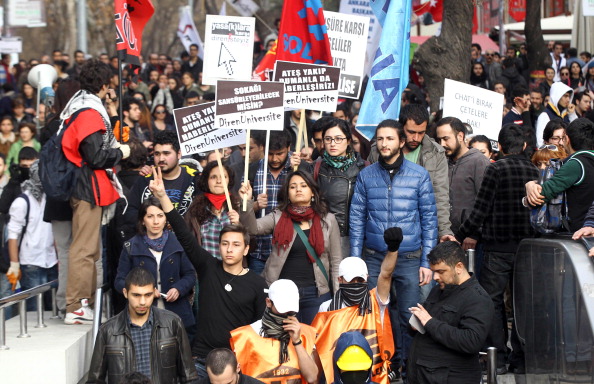
People hold placards reading ‘Will you censor the streets?’ during a demonstration against new Internet controls approved by the Turkish Parliament (Photo Credit: Adem Altan/AFP/Getty Images) .
With a little over a week to go before important municipal elections, the Turkish government blocked access to Twitter for millions of its citizens late last night.
Writing from Turkey, Andrew Gardner, Amnesty International’s researcher on Turkey described the move as “a desperate and futile measure, the latest move in the AKP’s clampdown on freedom of expression.”
In this morning’s press release, Gardner said, that this “draconian measure, brought under Turkey’s restrictive internet law, shows the lengths the government is prepared to go to prevent anti-government criticism.”
With major media outlets in Turkey largely cowed, and critical journalists often hounded out of their jobs or simply imprisoned, social media has taken on a particularly significant role in Turkish politics. In part for precisely this reason, it has been a particular target of Mr. Erdogan’s ire. He has described Twitter as a “social disease” and has repeatedly threatened to close down not only Twitter, but Facebook, and Youtube as well.
According to Reuters, Erdogan said in a speech yesterday:
“Twitter, mwitter!,” Erdogan told thousands of supporters at a rally in the northwestern province of Bursa, in a phrase translating roughly as “Twitter, schmitter!”
“We will wipe out all of these [presumably referring to social media, which he has attacked broadly in the past few weeks],” he said.
“The international community can say this, can say that. I don’t care at all. Everyone will see how powerful the Republic of Turkey is.”
Amnesty has long voiced concerns about internet freedom in Turkey:
Internet censorship has been widely practiced in Turkey with pro-Kurdish news sites and gay chat rooms among those targeted by the authorities.
YouTube was also blocked between 2007 and 2010 because of videos posted on the site allegedly “insulting the memory of Atatürk,” the founder of the Turkish Republic.
Google sites remain blocked in Turkey despite a ruling from the European Court of Human Rights that the order violates the right to freedom of expression.
In February this year the government passed further restrictive amendments to Turkey’s internet law which threaten the right to freedom of expression and privacy.
Amnesty International called for the amendments to be scrapped and instead for the law to be brought in line with international human rights standards.
Items posted on social media including Twitter have also led to unfair criminal prosecutions violating the right to freedom of expression. In Izmir, 29 young people are currently on trial for “encouraging people to break the law” over tweets they sent about the Gezi Park protests.
Content shared via social media is also being used to substantiate a prosecution brought under anti-terrorism laws against several members of Taksim Solidarity, an umbrella organization that played a leading role in the protest movement.
It is important to recognize, however, that the current ban on twitter is part of a larger program to stifle dissent and manage what information and ideas Turkish citizens have access to. Precisely because social media companies have been largely immune to the bullying that has brought most of Turkish mass media to heel, they have become an important sanctuary for public discourse in Turkey.
Just as Turkish police ran roughshod over the peaceful expression of dissent in the streets last week, the Turkish courts acted to stifle freedom of expression on the internet last night.
Describing the move as “a new low for internet freedom,” Amnesty International has called “on the Turkish authorities to immediately reverse the decision to block the social media site.”
Take action!
Amnesty has called for an international twitter campaign to voice our support for internet freedom in Turkey. Here are some suggested tweets, in Turkish and English:
.@RT_Erdogan İnternet yasaklarının ‘kökünü kazıyın’, Twitter’ın değil! Twitter yasağı kalksın!http://bit.ly/1ilGUgu#internetimedokunma
.@RT_Erdogan ‘Eradicate’ attack on internet freedom, not Twitter. Unblock Twitter in Turkey!#TwitterisblockedinTurkey#internetimedokunma
Nice Article
The world must be considered free thinking and why democracy is important, social networks play a vital role in our lives today.
,